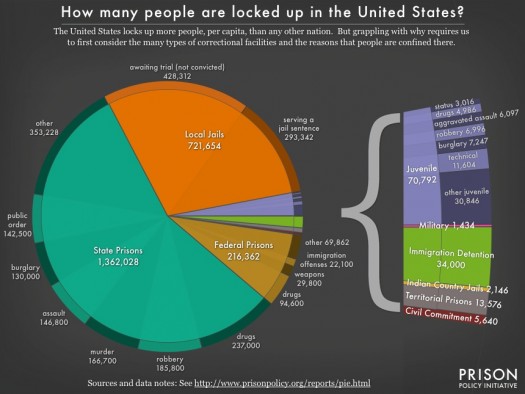Irrational Exuberance: Mass Incarceration is STILL An Epidemic…
I’ve been saying for a while that the rhetoric about the “end of mass incarceration” doesn’t match up with the reality that so many people in the U.S. continue to be locked up. Today, James Kilgore published an article on the topic where I am quoted. It’s worth reading (not because I am quoted but because he raises important points).
Ultimately, the report along with events like those in Ferguson, Missouri, reinforced the concerns of many anti-mass incarceration campaigners that current changes were not digging deep enough to yield long lasting results. Peter Wagner, Director of the Massachusetts-based Prison Policy Initiative, highlighted the need for states “to decide whether the people they are sending to prison really need to be there” and the corresponding issue of deciding which people “currently in prison can go home.” Instead, he lamented, states are continuing to hike “the number of people they send to prison for new offenses and violations of parole and decreasing the number of people they let out.”
Author and activist Ruthie Gilmore, who currently is associate director of the Center for Place, Culture and Politics at CUNY, argued that the BOJ statistics have exposed the shortcomings of “opportunists” who have “blown up real solidarity.” She maintains that moderate reforms have promoted “the delusion that it’s possible to cherry pick some people from the prison machine” rather than undertake a broad restructuring of the communities which have been devastated by mass incarceration. Mariame Kaba, head of Project NIA which practices transformative justice as a foil to youth incarceration in Chicago communities, concurred with Gilmore, stressing that “the rationale for and logic of punishment is unchanged. The targets of our punishment mindset also remain overwhelmingly black and poor.”
Kaba points out that the discourse has altered but policy seems to have lagged behind. “Talk and actions are not the same thing,” she said, “there is a need to move beyond awareness and take steps to address mass incarceration in real ways.”

“Lets not forget that people incarcerated in prison are just a portion of the people under control of the correctional system. There are jails, juvenile prisons, military prisons, immigration detention, Indian Country jails, territorial prisons, civil commitment, plus probation and parole of which there are 3,981,090 adults on probation, and 851,662 adults on parole.”
